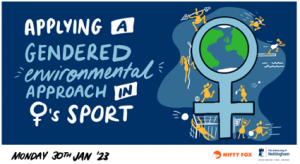March 27, 2023, by lzzre
Putting a New Paradigm into Practice
By Stephanie Coen, Associate Professor, School of Geography
If you had told me 5 years ago that I would be sitting around a table at the University of Nottingham with two academics I met on Twitter and four high-level practitioners within the UK’s elite sport system, I’m not sure I would have believed you! But this is exactly where I found myself on January 30th, 2023 for our knowledge exchange workshop “Applying a gendered environmental approach in women’s sport.”
The workshop brought together three academics – myself (Stephanie Coen), Sheree Bekker (University of Bath), and Joanne Parsons (University of Manitoba) – with four practitioners and leaders across Performance Innovation, Athlete Health and Physiology from the English Institute of Sport (Victoria Downie, Lucy Follett, Steve McCaig, and Richard Burden). The English Institute of Sport provides support services to British Olympic and Paralympic sports.
Our main goal for the day was to explore how a ‘gendered environmental approach’ (developed by Joanne, Sheree, and myself) could benefit UK Olympic and Paralympic sport. A gendered environmental approach seeks to ‘flip the script’ on the dominant sports injury paradigm which takes injury risk as a ‘biological fact’ of female bodies, and instead looks to the gendered conditions of sport (social norms, practices, relations, resources) that may function to place girls’/women’s bodies ‘at risk’.
Now, if that sounds complex, it’s because it is. Which is why we had diverse expertise in the room, from clinical to socio-cultural, aiming to foster knowledge exchange across practice and academia. Pushing against a paradigm is not easy, but we brought a shared sense of optimism and passion, as one participant put it, to “make a tangible impact in women’s sport and women and girls’ lives and health more broadly.”
Our work together benefitted immensely from the live scribing artistry of Laura Evans from Nifty Fox who was able to steer us toward achieving consensus and clarity on our collaborative goals and key messages. By the end of day, we identified opportunities to move new research and practice forward towards creating environments for all women athletes to thrive and fulfil their potential.
When reflecting on one key thing taken away from the workshop, participants commented on “the possibilities to have impact on both the high performance system and the wider sporting community,” “enthusiasm for collaboration from the whole group,” “people in that room on Monday are strongly committed to making a change,” and that “reframing of the problem space is critical.” Most participants also said the first action point coming out of the workshop should be another meeting to tackle “what and the how” of our collaborative work. Stay tuned—we are just getting started!
This workshop was supported by funding from The University of Nottingham’s ESRC Impact Acceleration Account ES/T501992/1.
No comments yet, fill out a comment to be the first


Leave a Reply